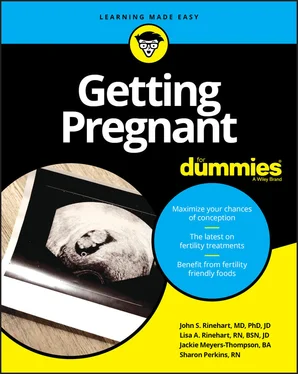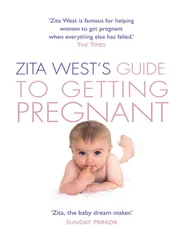Checking your blood levels
The good thing about having blood drawn is that a single specimen can be used to test for many different health conditions, including some that can interfere with getting pregnant; we look at a few in the next sections.
Looking at your thyroid function
Women who have an underactive or overactive thyroid may have trouble getting pregnant. Thyroid abnormalities can cause anovulation (no egg is released), irregular menstrual cycles, or short menstrual cycles. (See Chapter 2for more about menstrual dysfunction.)
Hypothyroid, or low thyroid levels, can raise your prolactin level ( prolactin is a hormone that helps control milk production in breastfeeding women). High prolactin levels can prevent ovulation; prolactin levels can be diagnosed with a blood test.
Running a chemistry panel
A chemistry panel tests your blood sugar to show if you have diabetes; it also tests your liver and kidney functions. Many health problems that can have impact on pregnancy can be found through a chemistry panel.
Checking your blood count
A complete blood count, or CBC, tests your hemoglobin, which shows if you’re anemic. It also tests your white blood count, which can show chronic infection.
 When you go for your routine checkup, your doctor will be doing the basic things to see if you are healthy overall. This is the starting point. Additional testing to assess why you are not getting pregnant is discussed in Chapter 11.
When you go for your routine checkup, your doctor will be doing the basic things to see if you are healthy overall. This is the starting point. Additional testing to assess why you are not getting pregnant is discussed in Chapter 11.
Checking your medications
Have you overlooked something that could be interfering with your getting pregnant? Think back a few months, especially when thinking about sperm production; the sperm being ejaculated today have been over two months in the making, so anything your partner was taking a few months ago could be affecting his sperm count today. Ask yourself the questions in the following sections about a few possible deterrents you may not have thought about.
Taking a closer look at prescription medications
What you put in your body may matter when you are trying to get pregnant. Taking a quick inventory of any ongoing or recent prescription drugs can identify if any of these are getting in your way:
Has your partner taken antibiotics, such as erythromycin or gentamycin, or antifungal medications, such as ketoconazole, or been treated for psoriasis with methotrexate? Has he been on anabolic steroids? These medicines can all affect sperm production.
Do you or your partner take medication for high blood pressure? Sometimes, when you’ve been taking a medication for a long time, you almost forget that it can have serious side effects. Men who take certain types of antihypertensives called calcium channel blockers may produce sperm that can’t penetrate eggs well; other high blood pressure medications may cause retrograde ejaculation, a condition in which the semen is pushed backwards into the bladder instead of being ejaculated out; or they may cause an inability to get and sustain an erection. Some antihypertensives are dangerous in early pregnancy as they can cause birth defects. Other antihypertensive drugs are available that don’t have these effects, so talk to your doctor about switching medications if possible.
 By definition, medications are substances that are prescribed and regulated by the FDA. Many medications can have a negative effect upon fertility or on a pregnancy, but there is an easy way to check the potential for problems on FDA-regulated drugs. Medications are categorized as to their effect on a pregnancy with the majority being either category B (okay to use) or category C (use only if benefit outweighs risk). By using this categorization system, you can determine if the medications you are taking are worth it:
By definition, medications are substances that are prescribed and regulated by the FDA. Many medications can have a negative effect upon fertility or on a pregnancy, but there is an easy way to check the potential for problems on FDA-regulated drugs. Medications are categorized as to their effect on a pregnancy with the majority being either category B (okay to use) or category C (use only if benefit outweighs risk). By using this categorization system, you can determine if the medications you are taking are worth it:
Category A is for drugs that have a proven safety record backed by research on women.
Category B drugs have shown safe use in animals, but there are no well-controlled studies in humans.
Category C includes drugs where animal studies have shown an adverse effect but there are no well-controlled human studies to tell us what happens in humans. This is where a risk-benefit evaluation helps to decide if the medication should be used.
Category D is where studies have shown an adverse effect for humans but where special circumstances may warrant the use of the medication.
Category X: Well, what do you think — does X sound good? You are right — the answer is “no.” These medications have proven adverse effects on pregnancy and no amount of benefit outweighs the risk — just don’t use them.
 Do not stop taking any prescription medication before discussing it with your doctor. You are on that medication for a reason!
Do not stop taking any prescription medication before discussing it with your doctor. You are on that medication for a reason!
 Some of the commonly used medications for fertility treatment have very scary warnings on their labels. Do not freak out! These warnings don’t apply to your situation (or else your physician would not be prescribing them) as long as the physician knows you are trying to get pregnant.
Some of the commonly used medications for fertility treatment have very scary warnings on their labels. Do not freak out! These warnings don’t apply to your situation (or else your physician would not be prescribing them) as long as the physician knows you are trying to get pregnant.
The good and bad of antidepressants
Considering how many people are using antidepressants, it is surprising how little research has been done on the influence of antidepressants on fertility. There are a number of categories of medications that are antidepressants. However, the largest group are the selective serotonin reuptake inhibitors (SSRIs). These work by increasing the levels of serotonin in the brain. Serotonin is a chemical in the brain that acts as a messenger between brain cells. Examples of SSRIs are Prozac, Lexapro, Zoloft, Paxil, and Celexa to mention a few.
A recent review identified 16 articles that studied the effect of SSRIs on fertility. Six of the studies demonstrated no effect on fertility, three suggested a negative effect, and one demonstrated an increase in pregnancy rate. Although the research methodology was considered poor, six of the studies demonstrated a negative effect on the semen parameters. So, what to do? First, ask yourself if you really need those little happy pills. If not, stop — under the direction of the prescribing physician since some cannot be stopped suddenly. If you truly need those pills, so be it. Just remember to notify your fertility doctor of the pills you are taking.
Reviewing nonprescription medications
It is amazing how often we grab an over-the-counter (OTC) medication to take care of a back sprain after playing pick-up basketball or a rash on the leg after hiking in the woods. Who checks with a doctor first? Well, things are different when you are trying to get pregnant and — as we warn you about vitamins and supplements in Chapter 9— you need to pay a little bit more attention to what you are putting in or on your body. Your fertility clinic will no doubt give you a list of medications that are acceptable, but here a few general tips that you should think about before popping a pill or rubbing on salve:
Acetaminophen is generally considered safe to use as a painkiller for various aches and pains.
Читать дальше

 When you go for your routine checkup, your doctor will be doing the basic things to see if you are healthy overall. This is the starting point. Additional testing to assess why you are not getting pregnant is discussed in Chapter 11.
When you go for your routine checkup, your doctor will be doing the basic things to see if you are healthy overall. This is the starting point. Additional testing to assess why you are not getting pregnant is discussed in Chapter 11. By definition, medications are substances that are prescribed and regulated by the FDA. Many medications can have a negative effect upon fertility or on a pregnancy, but there is an easy way to check the potential for problems on FDA-regulated drugs. Medications are categorized as to their effect on a pregnancy with the majority being either category B (okay to use) or category C (use only if benefit outweighs risk). By using this categorization system, you can determine if the medications you are taking are worth it:
By definition, medications are substances that are prescribed and regulated by the FDA. Many medications can have a negative effect upon fertility or on a pregnancy, but there is an easy way to check the potential for problems on FDA-regulated drugs. Medications are categorized as to their effect on a pregnancy with the majority being either category B (okay to use) or category C (use only if benefit outweighs risk). By using this categorization system, you can determine if the medications you are taking are worth it: Do not stop taking any prescription medication before discussing it with your doctor. You are on that medication for a reason!
Do not stop taking any prescription medication before discussing it with your doctor. You are on that medication for a reason! Some of the commonly used medications for fertility treatment have very scary warnings on their labels. Do not freak out! These warnings don’t apply to your situation (or else your physician would not be prescribing them) as long as the physician knows you are trying to get pregnant.
Some of the commonly used medications for fertility treatment have very scary warnings on their labels. Do not freak out! These warnings don’t apply to your situation (or else your physician would not be prescribing them) as long as the physician knows you are trying to get pregnant.










